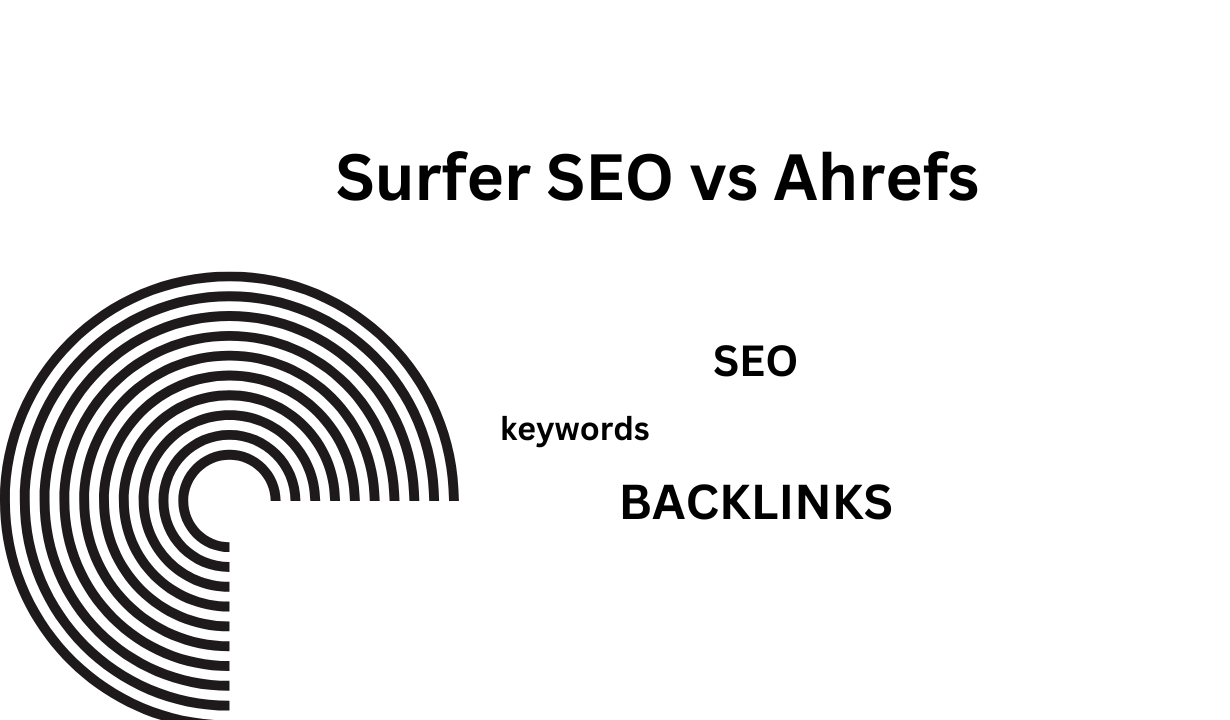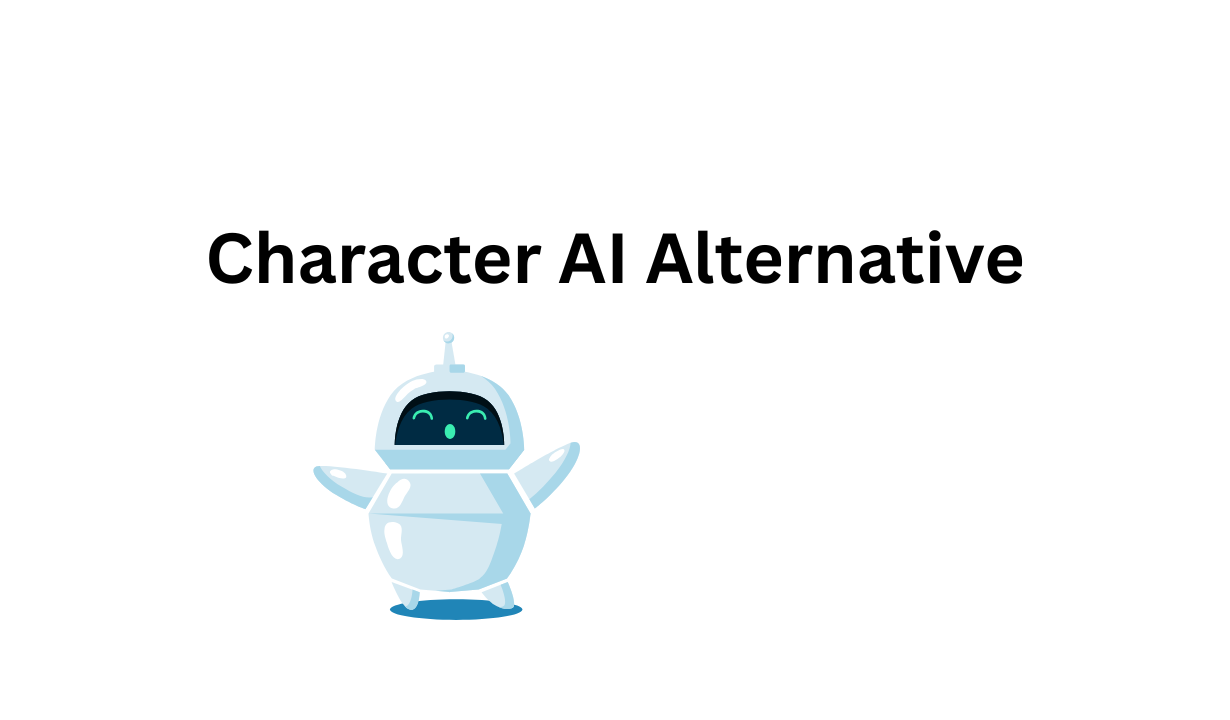Surfer SEO vs Ahrefs: Which Boosts Rankings Better? Trying to improve your site’s rankings? Both Surfer SEO and Ahrefs bring a lot to the table, but honestly, they’re built for different things. I’ve spent plenty of time with each, and in my experience, Surfer SEO really nails content optimization, while Ahrefs is the go-to for keyword research and backlink analysis.
Surfer SEO allows you to create and improve content utilizing real time data from the top ranking pages. It will decide for you what to write, what to add, it even harnesses an AI to fill in the gaps in content. Great, if your team is concentrating on content quality and on-page SEO.
Ahrefs, but, actually is more like a Swiss Army knife for SEO. Competitor analysis, backlink auditing, keyword tracking, the whole shootin’ match. It tells you about your site’s authority and is important to take into account for assessing your general strategy.
Surfer might be your better option then, especially if you would like to iterate quickly through content tweaks. But, if you’re planning on actively implementing a holistic SEO plan including link building and competitor analysis, utilizing both tools in unison only feels natural.
Core Differences Between Surfer SEO vs Ahrefs
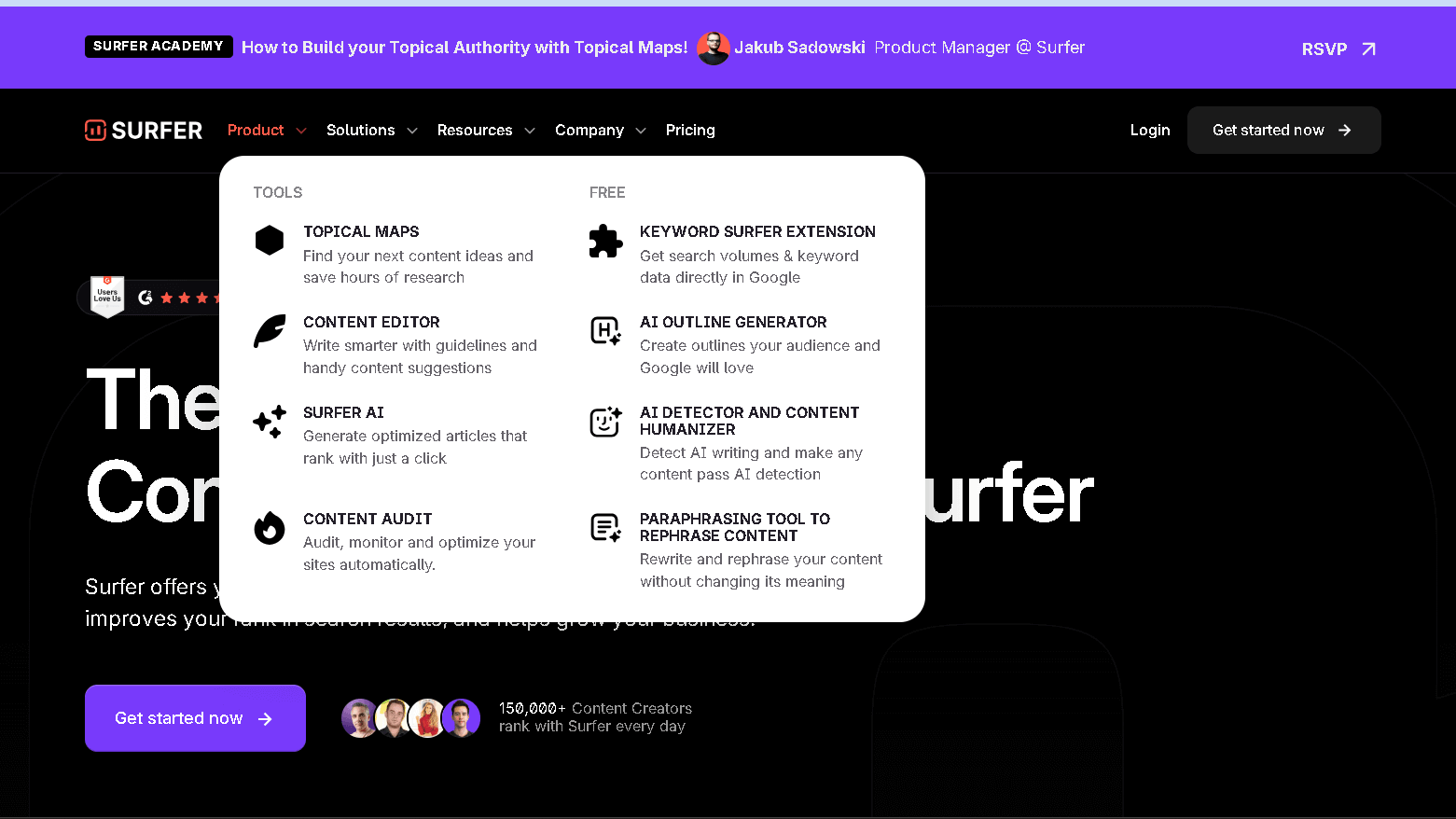
Surfer SEO and Ahrefs do two entirely different things in the realm of SEO, but they both have the goal of taking your website up the rankings . Here, one is more focused on optimizing your content, the other one gives you readers and research and backlinks. Each of their unique features and strengths will be seen to complement the other in your overall SEO game plan.
Approach to SEO
Surfer SEO centers around content optimization. It examines over 500 ranking factors on the go, and then it direct you on how to enhance your writing. You will receive recommendations on, for instance, semantic keywords, content gap filler, and how to structure your writing for Google, and even language models such as ChatGPT.
Ahrefs is more of an SEO research and analysis tool. It has an enormous keyword research database, as well as the ability to track backlinks and audit sites. Instead of tweaking your content, you’re looking outside of your own site using Ahrefs to find out where you can spot opportunities- other people’s sites, competitor keywords, or backlink profiles.
Intended User Base
Surfer SEO seems to have been developed for content teams, writers, and marketers who are interested in writing or optimizing content that actually ranks. Its ability to work with others is fairly simple, and it has collaboration tools and a live editor. Personally, I think it would work well for those who concern themselves with on-page SEO issues, or who have very specific content generation needs.
In other words, Ahrefs is for SEO pros who require very granular data on backlinks, keywords, and technical SEO. It is employed by agencies, specialists and site owners to develop strategy and to control many domains at once. It’s not so good for people who are looking for specifically content editing itself, or for an advanced understanding of SEO.
Overview of Key Strengths
| Feature | Surfer SEO | Ahrefs |
|---|---|---|
| Core function | On-page content optimization | Backlink analysis and keyword research |
| Collaboration | Free sharing, inline comments, link sharing | Limited collaboration, costly seats |
| Content optimization approach | Uses over 500 signals, semantic analysis, AI-assisted writing | Basic AI helper focused on fact checking |
| Keyword and backlink data | Lighter keyword discovery, lacks backlink data | Massive database and fast backlink crawler |
| Reporting and audits | Automated weekly content audits | Strong technical SEO and backlink audits |
Surfer is great for helping your content meet ranking needs with on-page insights. Ahrefs leads when it comes to external SEO factors like backlinks and competitive keyword tracking.
Impact on Search Engine Rankings
Looking at Surfer SEO vs Ahrefs, it’s clear they tackle different, equally important ranking factors. One focuses on making your content better, the other on backlinks and broader strategy. Both pull data from search results, but they use it in their own ways.
Content Optimization vs Backlink Strategy
Where Surfer SEO really excels is in content optimization. It examines over 500 ranking signals from top results and coaches your writing. They should help where there are gaps in your content, in a way that incorporates keywords naturally and also follows the structure that Google likes to see. I do like how it learns from different types of writing and that it’s all somewhat human sounding.
Ahrefs is a leader in backlink analysis. It has a very large link index that allows you to identify link building opportunities, find lost links, and perform a complete backlink analysis. As you’ll see further down on the list though, backlinks do matter but Ahrefs is going to be more concerned with building your authority than doing backflips with your content itself.
Surfer is the instrument I aim to use when I intend to enhance a page itself. When it comes building/facilitating or repairing backlinks I tend to use Ahrefs.
SERP Data Usage
Most importantly, Surfer SEO uses up-to-date SERP data to dictate their content recommendations. It scans for what top pages now have and lack so you can see exactly where to outdo them . And most importantly is the fact that its Content Score, is based on a bunch of factors and not just keyword counts, which is how Google operates nowadays.
Ahrefs does monitor SERP features and keyword movements but primarily for research purposes. This is useful to you in understanding how your competitors will see your site, and what keywords are likely to be difficult for you, but not so useful when it comes to making immediate and direct content adjustments.
With Surfer, you are always optimizing against live search data. Ahrefs provides a broader view for you – who are your competitors, what keywords are in the game, and where your website is.
Surfer SEO vs Ahrefs- Ranking Signals and Metrics
Surfer’s Content Score has a slight correlation with higher rankings, at around 0.28. It measures things like semantic relevance and comprehensiveness so I’m more likely to take its advice on increasing my visibility.
Ahrefs has a stronger weighting toward backlinks and keyword difficulty and has an average correlation with rankings of backlinks of around 0.17. There is still merit to backlinks, just far less than there used to be, because content quality all but drowns it out.
The value calculated by Surfer’s score is the page level relevance. Ahrefs tells you all about authority and competition. And using both will only provide more insight into what actually makes rankings change.

Keyword Research Capabilities Compared
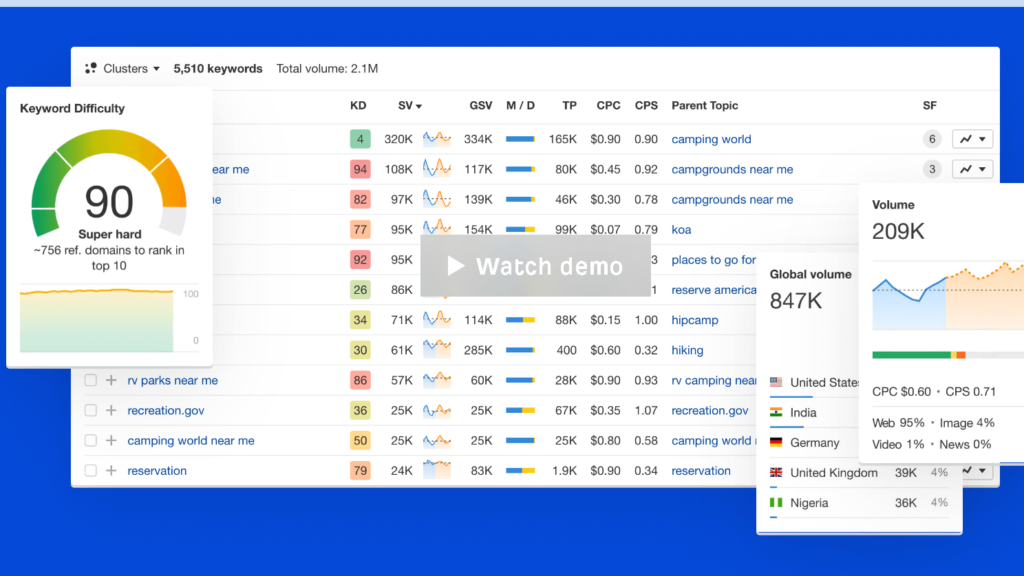
When I’m comparing keyword research tools, I care about how well they find valuable keywords, show search volume and difficulty, and help me size up the competition. These are the basics for a solid SEO plan.
Keyword Discovery Features
Surfer SEO helps me find keywords to focus more narrowly on my subject. It does keyword searching and even informs the writer on what keywords to use. This helps me to continue to write content that is in-line with popular search queries.
Ahrefs is much broader in scope, and has a vast database, listing thousands of keyword ideas . It includes Google, Bing, YouTube- you name it. This is beneficial when I’m looking to simply throw a massive net or find new content angles.
They are paired together because Ahrefs provides a broader set of related keywords and Surfer SEO focuses on the topical relevancy around a subject.
Search Volume and Keyword Difficulty
Ahrefs has extremely good search volume information that is constantly updated to reflect the times and I would highly recommend them. It provides a nice, clear keyword difficulty score as well, so I can easily and quickly understand what keywords it is worthwhile to pursue because I can see the level of difficulty.
While Surfer SEO does have search volume, they don’t provide as much data regarding difficulty. Its not the difficulty so much as the relevance- it’s meant to give people an idea of how to incorporate keywords in their writing if they are concerned about ranking.
If you really want ultra-accurate volume and competition data, Ahrefs is generally your best option. The more simplified metrics adopted by Surfer are useful at a glance, but.
Competitive Keyword Analysis
Ahrefs is particularly useful for researching competitors. I can easily identify what keywords other websites rank for, compare keyword gaps, or follow my competitors’ performance over time.
Surfer SEO is more concerned with what keywords the top pages are using to rank well, for more on fine- tuning your own content rather than deep competitor gap analysis.
If you are looking specifically for revealing key words your competitors may be ranking for, Ahrefs has more support. It also provides clear and step by step recommendations that will help you to enhance the use of keywords in your content.
Content Optimization and On-Page SEO Analysis
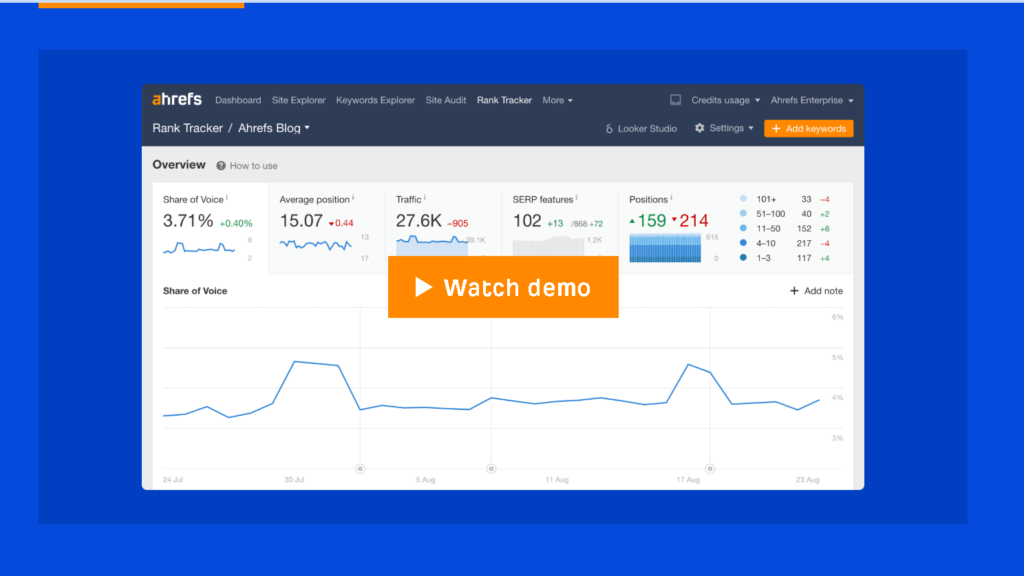
I care about how tools guide you to improve content for search rankings. That means editing tips, smart keyword use, and making sure everything is clear and SEO-friendly.
Content Editor and Content Score
The Content editor function of Surfer SEO is pretty amazing. It offers tips in the moment, as you write, by matching your article against higher ranking pages and presenting you with a content score indicating how closely you are aligning. That score helps me place where I am, and where I need to step it up.
The editor pinpoints keyword insertion or deletion points, headline adjustments and on-page elements such as length or reading level that need fixing. Ahrefs does not offer this type of editor so you’ll making content adjustments on your own here.
Surfer’s editor reads like a writing coach, pushing you in the direction of what Google wants. I can act on suggestions immediately, thereby saving me time and also to be able to rank my articles.
NLP Keyword Integration and Keyword Density
I can use Surfer SEO’s NLP keyword analysis to provide related semantically terms to my target keyword. This prevents my copy from sounding stilted from awkward keyword stuffing. Surfer will even tell me the keyword density so I know how many times to write each word.
Ahrefs is great for this, I love using it for deep research on a particular keyword, and it spits out lots of key metrics for me in terms of volume, and keyword difficulty . But it’s not so helpful in terms of how to integrate those keywords into your writing… .
Having the Surfer NLP focus allows me to also cater to Google’s newer algorithms, which are more focused on context and topic relevance than on string matching keywords.
Content Quality and Structure
Surfer SEO provides me with optimal headline, paragraph, and formatting suggestions based top performing results. It will also catch “skipped” sections or committing any one of these sins too often, to ensure my content remains readable and informative.
Ahrefs is more for the technical side of things and the backlink profile than optimizing your content structurally or for quality .
Taking Surfer’s recommendations I can create articles, structured in a clear and well organized way, with thorough coverage of the topics and with SEO in mind. This results in better UX and generally also in better rankings.
Backlink Analysis and Link Building
Backlinks matter, and building them is key for better rankings. I focus on exploring backlink profiles, checking out competitor link-building, and using internal linking to boost site authority.
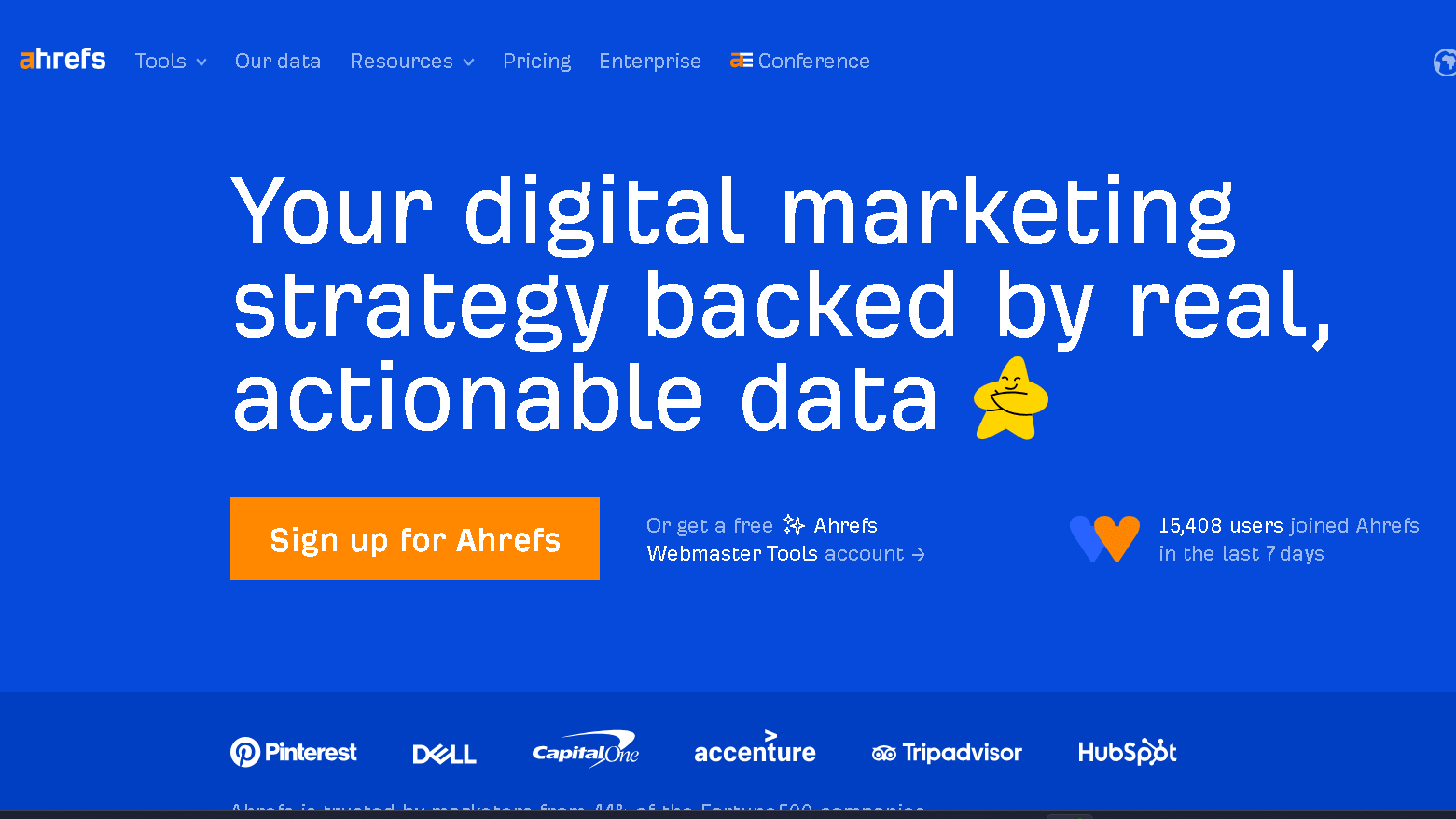
Backlink Profile Exploration
For scraping backlink profiles I use Ahrefs. It has a massive, up-to-date database; I can crawl my backlinks on this site quite well. This enables me to see new, lost and broken links, and maintain a healthy link profile.
Ahrefs provides metrics for the quality of the backlinks, it can identify spammy ones, and I’m able to disavow them using the same platform . This leaves me more time to concentrate on establishing stronger most more valuable connections.
Surfer SEO is really not set up for backlink analysis, so I continue to use Ahrefs for this task.
Competitor Link-Building Strategies
I also follow how the opposition is obtaining backlinks to keep pace. Ahrefs tells me which websites are linking to them, what type of content acquires the most links, and where I might be blind.
I keep a watch on the growth in links to a site and early rising domains to stay away from wasting time on tactics that aren’t successful. That allows for me to adapt to what actually might be working.
Surfer SEO doesn’t delook into competitor link-building analysis at all. It’s more about having your shine your content once you have the links coming in.
Internal Linking Insights
No one likes to talk about internal linking, but it’s very important for SEO. Surfer SEO assists in here through its automatic internal linking suggestions – made with semantic understanding of the content and the immediate information from Google Search Console.
I also use Surfer to discover the right spots for internal links, this is a good method to distribute authority and for search engines to get to know my site better from the inside.
This automated intelligent linking helps user-experience, and keyword relevancy, something that would require very tedious manual effort to correct for.
Using a combination of Ahrefs for external backlinks and Surfer for internal linking I feel I have a good basis for a linkbuilding and SEO strategy.
Site Audits and Technical SEO Features
When I compare Surfer SEO and Ahrefs on site audits and technical SEO, I look at how well they spot issues, find broken links, and keep track of site health. These functions are vital for keeping a website running smoothly and maintaining strong SEO.
Technical Audits and Issue Detection
Their technical audit is also the best of the two. It has a deep trawl on websites and catches an exhaustive array of things like… crawl errors, slow page speed, duplicate content, missing tags.
These reports do a good job of detailing the issues, and even highlight where the most urgent fixes are needed. Ahrefs also brings up common SEO issues as well so I can work to address these issues before they start to affect my rankings.
There are also site audit capabilities in surfer as well, but it is more oriented towards content performance and optimization. It will catch some technical issues though, but to be honest it doesn’t really compete with Ahrefs in terms of identifying difficult site-wide errors .
Broken Links Identification
Discovering broken links quickly is big for SEO, and Ahrefs excels there. There link index is huge and continually updated.
I catch broken internal and external links quickly, which helps to keep the pages fresh and accessible to visitors. It also helps that Ahrefs will show lost backlinks, in order that I know where to make recovery efforts to get back lost traffic.
Surfer SEO can detect some broken links but in my opinion is not as comprehensive and fast. For those that require the ability to uncover broken links, Ahrefs should be the tool of choice, as it has an industrial backlink database.
Site Health Monitoring
Ahrefs also alerts you to changes in the health of your site. It monitors technical SEO developments over time telling you if new crawl issues occur or the site errors increase.
This allows me to keep on top of maintenance. Content Audit – Similarly, Surfer SEO will perform some basic checks on your website’s health, howebut does not offer ongoing monitoring or technical notifications.
Its weekly audit reports concern content updates more than the comprehensive technical concerns.
| Feature | Ahrefs | Surfer SEO |
|---|---|---|
| Technical Audits | Comprehensive, detailed reports | Limited technical issue checks |
| Broken Links Detection | Fast, deep backlink and broken link tracking | Basic, less frequent detection |
| Site Health Monitoring | Continuous tracking and alerts | Weekly summaries, no alerts |
Usability, Collaboration, and Workflow for Content Teams
Surfer SEO and Ahrefs both offer unique tools that impact how content teams work together and produce SEO-friendly content. Their user interfaces, collaboration features, and content workflows feel pretty different, and that can really affect productivity for content marketers, SEO writers, and bloggers.
Surfer SEO vs Ahrefs-User Interface and Learning Curve
The UI is not complex and very intuitive within Surfer SEO. It almost seems like it was designed for content creators seeking fast and concise instruction.
The Content Editor provides accessible guidance in real time, meaning less time is wasted trying to figure out how to get going. On the other end, Ahrefs is feature rich on SEO research, but is a bit steeper to learn.
Ahrefs has the feel of being easier to navigate for beginners just starting out in pursuit of writing. But once you become accustomed to it the level of detail of the information is worth it.
Content Teams and Collaboration Tools
There are no additional charges for Surfer SEO’s collaboration capabilities. It is easy to share projects or work together using shareable links and team workflows.
This makes it perfect for agencies or content teams that have many writers and editors. The cost of adding multiple users to Ahrefs means that to an extent you could be working in silos, unless you pay additional fees.
It has no integrated content sharing so very often teams will depend on external tools. It is primarily concerned with SEO studies rather than collaborative content work.
Content Creation Workflow
The workflow of Surfer SEO’s is very much designed for creating content. It is a guiding hand in granular optimization, incorporating AI writing capabilities and real-time SEO guidance.
The live editor and automated suggestions support the content team in writing optimizable articles much more quickly. Ahrefs’ role in assisting with content creation is even more peripheral, consisting of keyword and competitor research.
It provides super descriptive in creating content briefs, but will rely on the user or a different tool for the writing and editing of the content. This type of system is good for groups that desire the research and data support but would like to be responsible for writing.
Choosing the Right Tool for Your SEO Strategy
Deciding between Surfer SEO and Ahrefs really depends on where your SEO priorities lie. Some folks need deep research on keywords and backlinks, while others want tools to improve the content they create.
Let’s look at how each tool fits different approaches, and how using them together can sometimes make the most sense.
SEO Professionals and Agencies
If you do SEO for a living, or have an SEO agency then you most likely require more than just content. Ahrefs excels in massive keyword searches, competitor research, and tracking backlinks.
It will enable you to track what is happening on the market and to make reports of your competitors’ link profile and perhaps, also to game new mentions to increase your domain authority.. Meanwhile, Surfer SEO is more for assisting content teams in publishing better-ranking articles via on-page optimization.
If your focus is content quality and on-page SEO, Surfer provides very comprehensive, real-time advice. I think Ahrefs for strategy and Surfer for the content side is a better combination to be honest. But each tier addresses a unique concern.
Content-Driven vs Data-Driven Approaches
Content generation is the focus of some SEO techniques. If you want strong, complete articles Surfer SEO is a good choice.
Instead it leans on AI to sift through piles of ranking signals and make recommendations to improve it – that is, inserting missing topics, adjusting keyword usage to meet user intent, etc. It even learns from the way you write and helps you close the loop on content.
But, if your approach is more data-centric, looking at things like search volume, keyword difficulty, or backlink authority, then Ahrefs would be more suitable. With a gigantic keyword database and enormous backlink index to match, you are able to extract the kind of insights that will allow you to plan campaigns that are capable of having measurable impact .
Between these two tools, it’s a decision whether to opimproveontent or to collect data for link building and targeting.
Integrating Both Tools for Comprehensive Results
Surfer SEO and Ahrefs tend to offer the best results when used in conjunction and this is an option many SEO teams go with . Combined, these span from in-depth research to fine content optimization.
I typically begin with Ahrefs for keywords, seeing what my competition is ranking for and what their backlink profiles look like. Then Surfer SEO narrows it down even further for you by making on page suggestions based on what is currently ranking.
Workflow and collaboration advantages exist for both of these as well. But Surfer offers collaborative writing and commenting at no additional cost, and Ahrefs has little beyond general information to inform strategy adjustments. Leveraging both can complement your overall digital marketing strategy and enhance each piece of your SEO work.
Frequently Asked Questions
I keep seeing the same questions pop up—people want to know about the specific tools each platform offers, how well they actually help improve content, and whether they’re worth the money. There’s also curiosity about how these tools perform in real-world SEO tasks.
What are the key differences in features between Surfer SEO and Ahrefs?
Surfer SEO is primarily a content optimization tool based on the analysis of live search and more than 500 ranking factors. Ahrefs is a more comprehensive SEO suite with an included collection of backlink, keyword research, and technical audit tools.
Ahrefs has more features, for example competitor research and backlink tracking, whereas Surfer is more relevant for those who want to focus on increasing content relevancy and quality, and improve its structure and make it more cohesive in order to rank .
How do Surfer SEO’s content optimization capabilities compare to those of Ahrefs?
These sorts of insights, provided by Surfer SEO, highlight keywords and content you should include and didn’t think of as well as noting topics you should cover. Its AI is there to complete your thoughts while preserving your writing style.
Ahrefs just implemented AI content help, which verifies fact coverage but feels a bit spotty. Surfer’s methodology seems more empirical and is analogous to the way Google, and language models in general, rank content.
Can Surfer SEO’s audit tool increase rankings more effectively than Ahrefs’ site audit?
The focus of Surfer’s audit tool is on content performance. It indicates the pages to improve and recommends changes to them based on the pages that are currently ranking.
Ahrefs’ site audit focuses on technical SEO issues, like broken links, and crawl errors. These both do different things, but if you’re looking to improve content-related ranking factors then the Surfer audit looks to be better.
What are the pricing differences between Ahrefs and Surfer SEO for similar services?
Ahrefs has additional pricing for their content optimization tools, and occasionally the price is similar to Surfer’s full price deal.
Also, Surfer SEO has a lot of the content optimization tools included in their basic plan, so it’s easier if all you want is to optimize your content to rank better.
Is there a noticeable difference in accuracy between Ahrefs’ and Surfer SEO‘s keyword research tools?
Ahrefs’ keyword database is significantly larger and more frequently updated, as is the case with keyword information in general as well as that of your competitors.
Surfer SEO also has a keyword discover feature, but to a lesser degree. If you are into a more detailed keyword research, then Ahrefs will provide you with more accurate and complete information.
How do user experiences differ when using Surfer SEO versus Ahrefs for improving site rankings?
Surfer SEO is big on collaboration. You’re able to easily share stuff, add inline comments, and it integrates into well known writing platforms.
It pushes content teams to get better faster, which feels fairly effective.
Ahrefs, but, does add in lengthy SEO reports. If you truly want to collaborate as a team you have to go for the more expensive plans.
The interface? There is no fighting its power but quite honestly, all this power can be a little overwhelming when you just want to focus on what you are writing.
As we plunge deeper into 2024, the battle of SEO tools continues to heat up, with Surfer SEO and Ahrefs standing at the forefront. Both of these powerful platforms offer unique features that cater to the varying needs of SEO professionals. Whether you’re a seasoned expert or just starting out, understanding the nuances of Surfer SEO vs Ahrefs can help you make informed decisions about your SEO strategy, especially when it comes to keyword research, content optimization, and competitor analysis.
You can also read:

